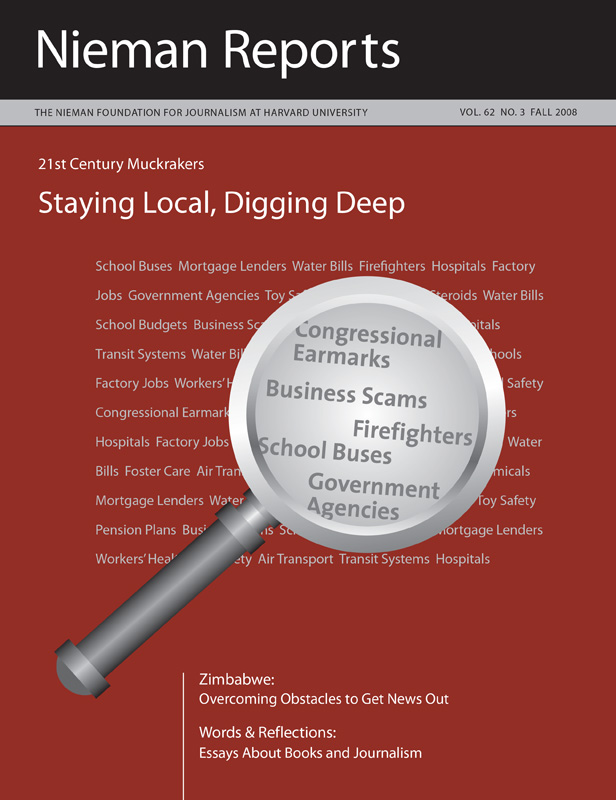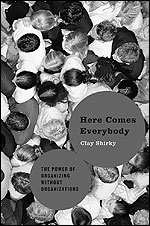Clay Shirky’s uncle was a newspaperman in small-town Missouri. When USA Today debuted in 1982, Uncle Howard didn’t like it one bit—he called it “TV on paper” and thought it degraded the business. But the upstart was still words and pictures on paper—just designed and distributed in a new way. It was familiar enough that Howard could quickly size up its potential impact on his business. It was a threat to the status quo, but a recognizable one.
Old newspaper hands had a lot more trouble understanding the Internet as a competitor in the 1990’s. How could a geeky computer network render obsolete something as fundamental as a newspaper? It must have seemed absurd—as if the world’s demand for socks was suddenly replaced en masse with licorice.
Shirky’s terrific new book, “Here Comes Everybody: The Power of Organizing Without Organizations,” is an excellent primer for those journalists who feel confused by the impact technology is having on their industry—those who, at some fundamental level, feel they don’t get the Internet. Only a fraction of the book is directly about the news business; his narrative sweeps from Belarusian political movements to a case of New York cell phone theft. But all of Shirky’s ideas echo against the established paths of human communication. His book is fundamentally one of theory: How does technology change the ways human beings interact? And what are the implications for those institutions built around the old models?
His central argument is that the Internet makes organizing groups trivially simple. A mass e-mail, a Facebook group, or an online petition can be created in seconds and at essentially no cost. Collaboration on any significant scale used to require the power of institutions and organizations. Now they require only a good idea and the right tools.
Shirky—a professor at New York University and a consultant on Internet issues—asks you to define “group” broadly. It could be something conventional, like a Kiwanis Club or a bowling league. But a group could also be more abstract, like “fans of Thai surf-rock bands from the 1960’s.” Or “people who are interested in the Milwaukee city council.”
Traditional news organizations profited from making the connections that create and connect these groups. Those people interested in the Milwaukee city council needed a way to find the information they wanted, and newspapers made that connection. Department stores wanted to be able to reach people who needed clothes and appliances—and newspapers made that connection, too.
But with the Internet, retailers don’t need newspapers to connect with their customers; they can set up their own Web sites and mailing lists. Milwaukee’s civic-minded can start a blog and post leaked documents to their hearts’ content. It’s the same antimiddleman trend that lets Amazon cut retail stores out of the chain from supplier to buyer.
Another middleman job Shirky identifies: Deciding what combination of news was the most important for the public to know. Traditionally, that’s been a job for newspaper editors, the ones who decide what makes Page One and what gets cut for space. But space isn’t a limited resource anymore; there’s no shortage of electrons. Instead of trusting the local paper’s brain trust to judge what’s important, any Internet user can get their news through the filter of their choice—a favorite blogger, the machine-generated Google News, or the Most E-Mailed list on some news site. Or they can find news about the near-infinite number of subjects American newspapers find too uninteresting to cover at all.
What was once an important role—making editorial choices—starts to feel more like a bottleneck in the system.
Shirky argues these changes are enormously freeing. The news business, like any profession, has evolved its own set of rules about what gets covered and what gets ignored. Those rules get thrown out the window when the flow of information slips out of the control of a few village elders. And that means that a new, smarter grammar of news gets the chance to evolve from scratch.
Even though Shirky is in one sense dancing on the graves of traditional organizations, some of his best material is his analysis of how they operate. He’s particularly smart on how professions function—on how their members prefer approval from within the profession than from society at large or on their natural reaction against new outside competition for their work.
Shirky isn’t a techno-utopian. He acknowledges that previous technological shifts engendered periods of chaos and unrest before society coalesced around a new set of rules. But he seems optimistic that the work journalists do will survive and thrive in the new environment. As for journalists themselves—or their hopes for a decent paycheck—well, that’s another matter.
He writes several times of the role of scribes in the 1400’s—the few literate monks who handcopied books for centuries. They were critical for the preservation of civilization. Then along comes a fellow named Gutenberg. Suddenly, scribes were no longer a necessary link between knowledge and learner. History records the dislocating impact of Gutenberg’s invention—the Protestant Reformation among them. But what happened to the poor scribes?
Shirky quotes an apologia called “In Praise of Scribes,” written by a German abbot in 1492. Instead of citing the benefits scribes brought society, the author cited the benefits all that bookcopying brought the scribes. (“His understanding is enlightened as he writes,” for one.) Before too long, scribes devolved into calligraphers, and a role once critical to human knowledge was reduced to decoration.
“In Praise of Scribes,” Shirky notes dryly, wasn’t produced by the monks it lauded. It was made on a printing press.
Joshua Benton, a 2008 Nieman Fellow, is editor of the Nieman Journalism Lab.
Old newspaper hands had a lot more trouble understanding the Internet as a competitor in the 1990’s. How could a geeky computer network render obsolete something as fundamental as a newspaper? It must have seemed absurd—as if the world’s demand for socks was suddenly replaced en masse with licorice.
Shirky’s terrific new book, “Here Comes Everybody: The Power of Organizing Without Organizations,” is an excellent primer for those journalists who feel confused by the impact technology is having on their industry—those who, at some fundamental level, feel they don’t get the Internet. Only a fraction of the book is directly about the news business; his narrative sweeps from Belarusian political movements to a case of New York cell phone theft. But all of Shirky’s ideas echo against the established paths of human communication. His book is fundamentally one of theory: How does technology change the ways human beings interact? And what are the implications for those institutions built around the old models?
His central argument is that the Internet makes organizing groups trivially simple. A mass e-mail, a Facebook group, or an online petition can be created in seconds and at essentially no cost. Collaboration on any significant scale used to require the power of institutions and organizations. Now they require only a good idea and the right tools.
Shirky—a professor at New York University and a consultant on Internet issues—asks you to define “group” broadly. It could be something conventional, like a Kiwanis Club or a bowling league. But a group could also be more abstract, like “fans of Thai surf-rock bands from the 1960’s.” Or “people who are interested in the Milwaukee city council.”
Traditional news organizations profited from making the connections that create and connect these groups. Those people interested in the Milwaukee city council needed a way to find the information they wanted, and newspapers made that connection. Department stores wanted to be able to reach people who needed clothes and appliances—and newspapers made that connection, too.
But with the Internet, retailers don’t need newspapers to connect with their customers; they can set up their own Web sites and mailing lists. Milwaukee’s civic-minded can start a blog and post leaked documents to their hearts’ content. It’s the same antimiddleman trend that lets Amazon cut retail stores out of the chain from supplier to buyer.
Another middleman job Shirky identifies: Deciding what combination of news was the most important for the public to know. Traditionally, that’s been a job for newspaper editors, the ones who decide what makes Page One and what gets cut for space. But space isn’t a limited resource anymore; there’s no shortage of electrons. Instead of trusting the local paper’s brain trust to judge what’s important, any Internet user can get their news through the filter of their choice—a favorite blogger, the machine-generated Google News, or the Most E-Mailed list on some news site. Or they can find news about the near-infinite number of subjects American newspapers find too uninteresting to cover at all.
What was once an important role—making editorial choices—starts to feel more like a bottleneck in the system.
Shirky argues these changes are enormously freeing. The news business, like any profession, has evolved its own set of rules about what gets covered and what gets ignored. Those rules get thrown out the window when the flow of information slips out of the control of a few village elders. And that means that a new, smarter grammar of news gets the chance to evolve from scratch.
Even though Shirky is in one sense dancing on the graves of traditional organizations, some of his best material is his analysis of how they operate. He’s particularly smart on how professions function—on how their members prefer approval from within the profession than from society at large or on their natural reaction against new outside competition for their work.
Shirky isn’t a techno-utopian. He acknowledges that previous technological shifts engendered periods of chaos and unrest before society coalesced around a new set of rules. But he seems optimistic that the work journalists do will survive and thrive in the new environment. As for journalists themselves—or their hopes for a decent paycheck—well, that’s another matter.
He writes several times of the role of scribes in the 1400’s—the few literate monks who handcopied books for centuries. They were critical for the preservation of civilization. Then along comes a fellow named Gutenberg. Suddenly, scribes were no longer a necessary link between knowledge and learner. History records the dislocating impact of Gutenberg’s invention—the Protestant Reformation among them. But what happened to the poor scribes?
Shirky quotes an apologia called “In Praise of Scribes,” written by a German abbot in 1492. Instead of citing the benefits scribes brought society, the author cited the benefits all that bookcopying brought the scribes. (“His understanding is enlightened as he writes,” for one.) Before too long, scribes devolved into calligraphers, and a role once critical to human knowledge was reduced to decoration.
“In Praise of Scribes,” Shirky notes dryly, wasn’t produced by the monks it lauded. It was made on a printing press.
Joshua Benton, a 2008 Nieman Fellow, is editor of the Nieman Journalism Lab.




